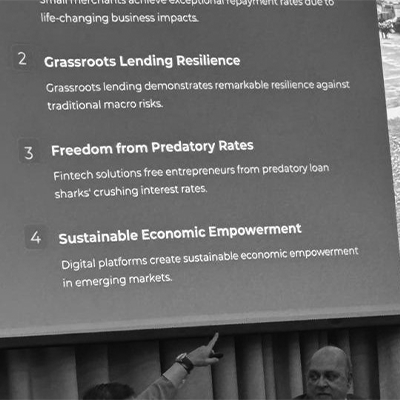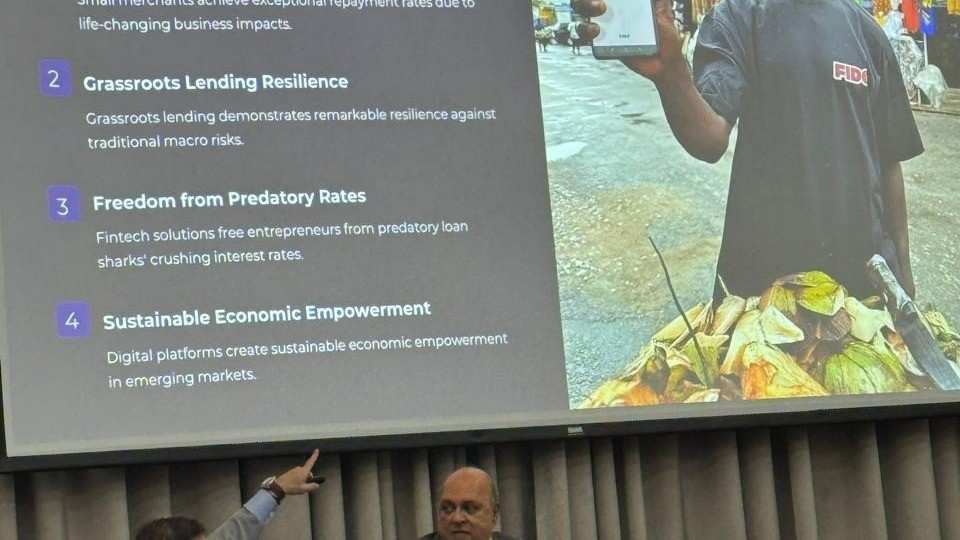Unlocking the Future of Digital Lending in Emerging Markets: Reflections from the SixPoint Capital Summit in Dubai

Our CEO Noshad Minhas recently had the opportunity to attend the Annual Emerging Market Fintech Lending Summit, hosted by SixPoint Capital in Dubai. Unlike any other fintech summit I’ve attended globally, this workshop style event was intense, insight-packed, and raised the collective learning curve of all attendees to an entirely new level.

Session 1: Navigating VC Funding & Scaling Fintechs
Moderated by the ever-articulate AJ Davidson (CEO & Co founder SixPoint Capital ) the opening session set the tone by addressing one of the most pressing challenges in our space venture capital funding for emerging market fintechs. AJ shared compelling data:
- Global private markets stood at $1.5 trillion in 2024, expected to reach $2.8 trillion by 2028.
- Asset-based lending is projected to grow from $625 billion to $1.3 trillion by 2030 (Source: Morgan Stanley).
- Fintechs are forecasted to grow 3x faster than traditional banking between 2022–2028 (Source: McKinsey).
- Lending-related fintech revenue is poised to reach $400 billion, with fintech lenders contributing over 30% of this by 2030.
Perhaps the most striking figure: the potential lending demand in emerging markets is a staggering $11 trillion, with $8.9 trillion from SMEs alone. This is the untapped frontier we’re all working to unlock.
Session 2: My Favourite : A Masterclass in Market Wisdom
This session was the absolute highlight of the summit for me. AJ brilliantly deconstructed the inimitable Mr. Matin Khalif, also known as Dr. Gloom, whose blend of deep financial insight and razor-sharp wit left the room both enlightened and entertained.
Dr. Gloom’s reflections were both sobering and empowering:
- “Forecasting emerging currencies is like guessing the ending of a Bollywood film—full of drama, rarely logical.”
- He made a strong case for fintech as a force of liberation, freeing entrepreneurs from predatory lending.
- He emphasized the data-driven revolution, where alternative data and technology are finally enabling credible credit assessments in markets long underserved by traditional institutions.
Other Noteworthy Sessions: A Deep Dive into Lending Innovation
The subsequent panels were equally enriching:
- Panel 2: Explored the evolution of private credit and emerging alternatives.
- Panel 3: Highlighted how AI and unconventional data sources are reshaping credit scoring and risk management in real time.
- Panel 4: “From Vision to Term Sheet” dissected hybrid capital strategies perfect for early-stage fintech founders.
- Panel 5: Covered the legal and structural nuances of closing a debt deal. I appreciated the discussion around structuring back-leverage with group companies—a vital lens for digital lending startups.
- Panel 6: The summit ended strong with fintech founders and CEOs discussing how to chart the future of digital finance in the Global South.
A shoutout to Omar Saleh (CEO Khazna ) whose insights on consumer lending truly resonated with me. His argument was simple yet profound: consumer lending is the first step to financial inclusion. By including individuals in the financial system through basic lending, we create the foundation for credit histories that unlock home, car, and business loans a virtuous cycle of economic empowerment.
Closing Reflections: How Hakeem is Building the Future
As I reflect on the summit’s key takeaways, one thing is clear: emerging markets hold the greatest untapped potential in global finance—but realizing that potential requires localized, ethical, and inclusive solutions.
That’s exactly what we are building at Hakeem.
At Hakeem, we’re on a mission to make digital credit a reality for the world’s underbanked and unbanked communities. By offering Shariah-aligned digital financial services, we’re not just lending, we’re enabling lives, empowering entrepreneurs, and creating pathways to sustainable growth.
Through our data-driven underwriting, alternative credit scoring, and inclusive product design, Hakeem is bridging the $11 trillion lending gap in emerging markets while staying true to the values of Islamic finance.
This summit reminded me why we do what we do.
The future of finance isn’t just digital , it’s ethical, inclusive, and built for the billions still waiting on the sidelines.
